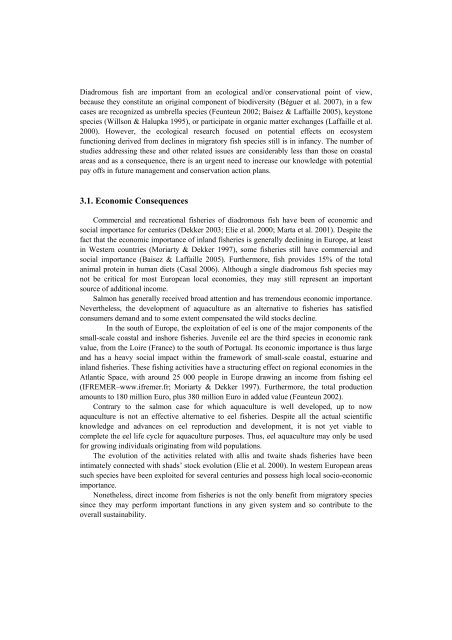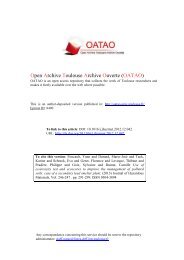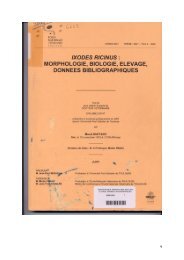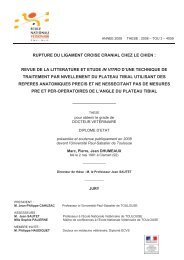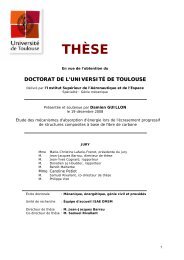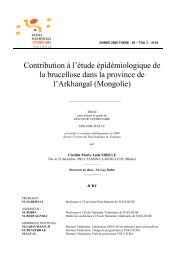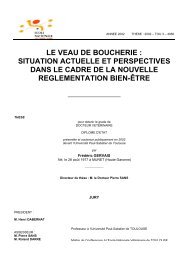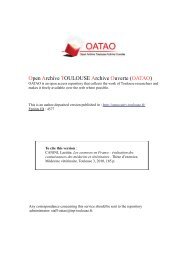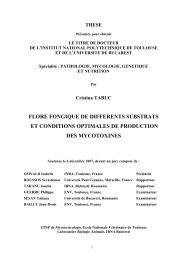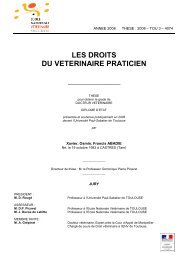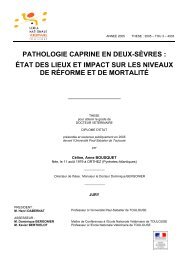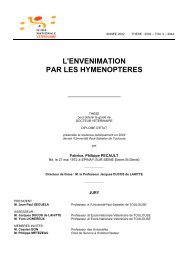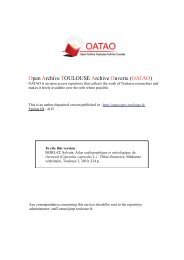PDF ( Author's version) - OATAO (Open Archive Toulouse Archive ...
PDF ( Author's version) - OATAO (Open Archive Toulouse Archive ...
PDF ( Author's version) - OATAO (Open Archive Toulouse Archive ...
Create successful ePaper yourself
Turn your PDF publications into a flip-book with our unique Google optimized e-Paper software.
Diadromous fish are important from an ecological and/or conservational point of view,<br />
because they constitute an original component of biodiversity (Béguer et al. 2007), in a few<br />
cases are recognized as umbrella species (Feunteun 2002; Baisez & Laffaille 2005), keystone<br />
species (Willson & Halupka 1995), or participate in organic matter exchanges (Laffaille et al.<br />
2000). However, the ecological research focused on potential effects on ecosystem<br />
functioning derived from declines in migratory fish species still is in infancy. The number of<br />
studies addressing these and other related issues are considerably less than those on coastal<br />
areas and as a consequence, there is an urgent need to increase our knowledge with potential<br />
pay offs in future management and conservation action plans.<br />
3.1. Economic Consequences<br />
Commercial and recreational fisheries of diadromous fish have been of economic and<br />
social importance for centuries (Dekker 2003; Elie et al. 2000; Marta et al. 2001). Despite the<br />
fact that the economic importance of inland fisheries is generally declining in Europe, at least<br />
in Western countries (Moriarty & Dekker 1997), some fisheries still have commercial and<br />
social importance (Baisez & Laffaille 2005). Furthermore, fish provides 15% of the total<br />
animal protein in human diets (Casal 2006). Although a single diadromous fish species may<br />
not be critical for most European local economies, they may still represent an important<br />
source of additional income.<br />
Salmon has generally received broad attention and has tremendous economic importance.<br />
Nevertheless, the development of aquaculture as an alternative to fisheries has satisfied<br />
consumers demand and to some extent compensated the wild stocks decline.<br />
In the south of Europe, the exploitation of eel is one of the major components of the<br />
small-scale coastal and inshore fisheries. Juvenile eel are the third species in economic rank<br />
value, from the Loire (France) to the south of Portugal. Its economic importance is thus large<br />
and has a heavy social impact within the framework of small-scale coastal, estuarine and<br />
inland fisheries. These fishing activities have a structuring effect on regional economies in the<br />
Atlantic Space, with around 25 000 people in Europe drawing an income from fishing eel<br />
(IFREMER–www.ifremer.fr; Moriarty & Dekker 1997). Furthermore, the total production<br />
amounts to 180 million Euro, plus 380 million Euro in added value (Feunteun 2002).<br />
Contrary to the salmon case for which aquaculture is well developed, up to now<br />
aquaculture is not an effective alternative to eel fisheries. Despite all the actual scientific<br />
knowledge and advances on eel reproduction and development, it is not yet viable to<br />
complete the eel life cycle for aquaculture purposes. Thus, eel aquaculture may only be used<br />
for growing individuals originating from wild populations.<br />
The evolution of the activities related with allis and twaite shads fisheries have been<br />
intimately connected with shads’ stock evolution (Elie et al. 2000). In western European areas<br />
such species have been exploited for several centuries and possess high local socio-economic<br />
importance.<br />
Nonetheless, direct income from fisheries is not the only benefit from migratory species<br />
since they may perform important functions in any given system and so contribute to the<br />
overall sustainability.


